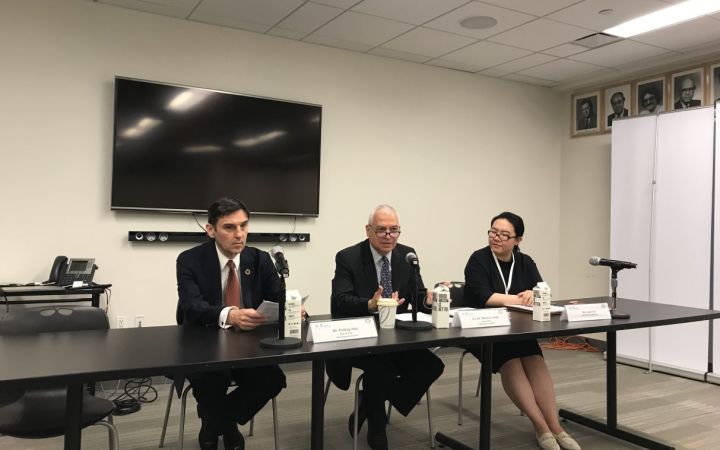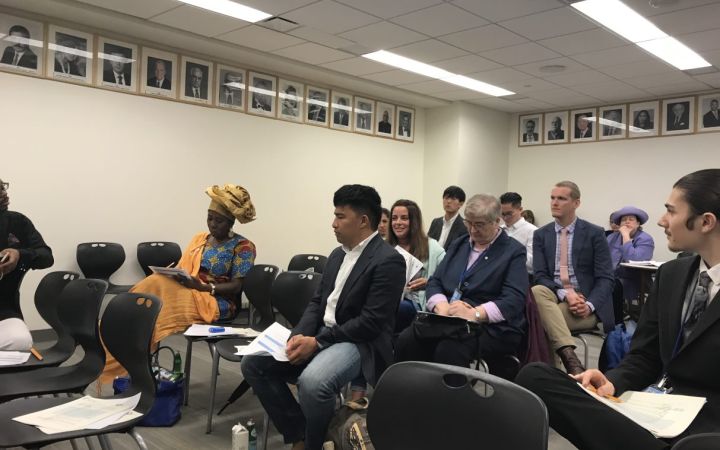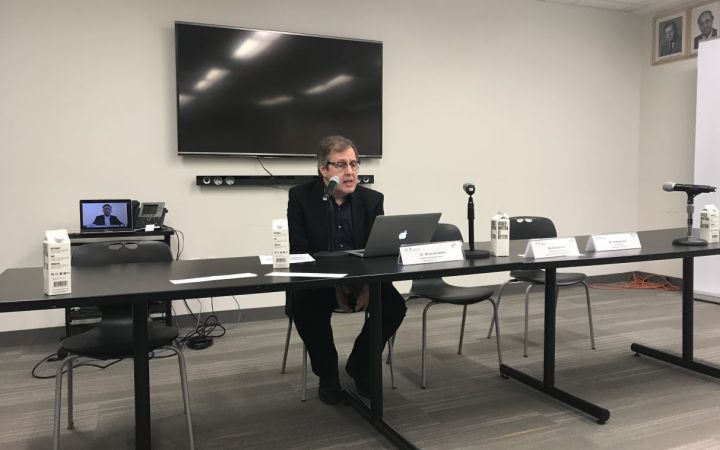13 June 2019, New York, USA - The United Nations Institute for Training and Research (UNITAR NYO) hosted the event “Music for Disadvantaged Demographics”. This event was conducted in the format of workshop in collaboration with the Time Ranger Inc. – a multinational firm dedicated to incubating and supporting programmes related to arts and music. This workshop complimented the progress achieved during the twelfth session of the Convention on the Rights of Persons with Disabilities (CRPD). UNITAR believes in the value of music, and its ability to unify the lives of people from different cultures around the world. This series of workshop have touched upon several challenges faced by SDG, and offered an alternative and creative solution by analyzing and discussing the effect of music.
The event was opened by Mr. Marco Suazo, Head of UNITAR Office in New York. In his remarks, Mr. Suazo expressed the importance of delivering programing that highlight and advance fulfilling the needs of disadvantaged communities to meet SDG targets and to ensure that no one is left behind. Furthermore, Mr. Suazo underscored how music can improve lives and connect one another.
In Session I: “Music and Special Education”, Mr. Predrag Vasic, Music Director of UN Symphony Orchestra presented on “Music as an effective tool for carrying on the UN mission”. Mr. Vasic shared contemporary research that has proven that listening to music to improve one’s quality of life, reduce stress, improve academic performance, reduce depression, improve eating and sleeping habits. Furthermore, music is powerful force that can help with motivation, build reconciliation, confidence, aspiration, and trust. Mr. Vasic cited results from El Sistema, a music program that has been lauded for the positive effects it has had on impoverished youth and their surrounding community. Mr. Vasic also elaborated on the UN Symphony Orchestra’s role in promoting the SDGs. They have played at various UN commemorations to help inspire peace and harmony. Recently, the UN Symphony Orchestra held a performance that featured works made exclusively by Latin American composers, and in the future, they plan to have a programme devoted to the works of women composers.
The next topic, ‘Amateur Adult Music-Making: How does it Matter?” was given by Elena Rahona, Founding Executive Director, New York Late-Starters String Orchestra. In her discussion, she highlighted the importance of helping to connect adults who are novice musicians, or who have not played for many years, with others in a similar community. By creating spaces for adult learners to preform together, it helps to combat ageist tropes that only children, or the highly-talented are allowed to play music. Through this, other often neglected demographics are able to experience the benefits that playing music can bring.
The last topic of this session was presented by Ms. Angie Sheehan, Founder, Princeton University Ballet. In her talk, participants were encouraged to expand their definition of music and art, and to find value in youths who demonstrate passion for performing but may not have been classically trained. With this, she hopes to continue to connect youth from all backgrounds into the arts.
In Session II: Music in Disadvantaged Communities, speakers further explored the impact that music can have on different communities.
In the presentation, “The Meaning and Practice in Music Therapy”, Mr. Jisheng Yang, Marketing Director of Music Culture and Media, ASK Berlin Media Design University of Applied Science, joined the group via webcast, to shared how music therapy offers benefits to children with autism. Music therapy can help autistic children cope with anxiety and overcome barriers to social interaction. It also helps with developmental growth and as an outlet for emotions.
Next, Dr. Bruce Brubaker gave an enlightening talk on “Music Education in Disadvantaged Communities”. This presentation offered a perspective on how musicality is interpreted globally based on one’s native language. Given this, Dr. Brubaker challenged the adage “Music is the universal language”, and suggested an alternative more inclusive phrase, “The universe of music has many languages”.
Closing remarks were made by Ms. Lucia Guo, CEO of Time Ranger Inc., who emphasized the meaningful impact music has on all lives and thanked both speakers and participants for attending the event.
Panelists:
Ms. Lucia Guo, CEO of the Time Ranger Inc.
Mr. Predrag Vasic, Music Director of UN Symphony Orchestra
Ms. Elena Rahona, Founding Executive Director, New York Late-Starters String Orchestra
Ms. Angie Sheehan, Princeton University Student Representative, Founder of the Princeton University Ballet
Mr. Jisheng Yang, Marketing director of music culture and media, ASK Education Group, Academic for arts ASK Berlin Media Design University of Applied Science
Dr. Bruce Brubaker, Chairman of the piano department, New England Conservatory




